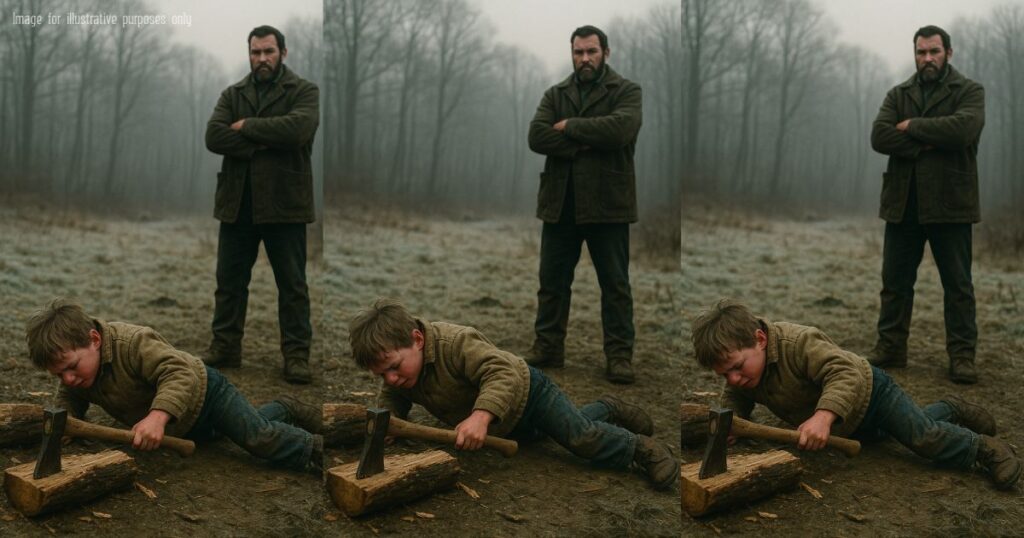“I hadn’t planned on swinging the ax that morning — not at my age, and certainly not after the fall.”
I must’ve lain there a good few minutes, listening to my breath fog out into the cold, the back of my head throbbing where it hit the porch rail. A hawk circled overhead. The kind my dad once said carried the spirits of stubborn men.
I grinned through the pain. “Well, go on, then,” I muttered. “I ain’t ready to fly just yet.”
It took some doing, but I got up — slow and stiff like an old barn door on rusted hinges. Inside, I poured black coffee into the tin mug Clara used to warm between her palms. Funny how heat lingers in things long after the hands are gone.
By noon, I’d managed to stack half a dozen logs by the stove. The fire crackled like it approved, and the scent of hickory smoke drifted up the chimney like a hymn. I sat by the window and watched the road. Eli always came up the gravel lane too fast, fishtailing near the curve, like I used to.
But this time, no dust cloud. No headlights. Just silence and snow.
By dusk, worry began to settle in my bones — that deep kind of worry only grandparents know. I called his number. Straight to voicemail.
I told myself kids these days don’t think to charge their phones. Told myself the roads might be slick. Told myself a thousand things — until I saw the headlights.
But it wasn’t Eli’s pickup.
The car was black, city-clean. A man stepped out in a suit. He looked uncomfortable, like the air didn’t suit him.
“You Mr. Henry Latham?”
I nodded, heart already galloping.
He cleared his throat. “Your grandson’s been in an accident, sir. Not life-threatening — broken wrist, mild concussion. He’s resting now, but he insisted we come and tell you in person. Said you wouldn’t believe it unless someone looked you in the eye.”
I leaned against the porch rail, the one I’d cracked my skull on that morning. It suddenly felt like a blessing.
“He wanted us to give you this,” the man said, holding out a folded sheet of notebook paper.
It was Eli’s handwriting. Sharp, earnest. The kind of penmanship they don’t teach anymore.
“Grandpa — don’t worry. I’m fine. Just banged up. I’ll be there tomorrow or the next day. I was trying to bring you something. It’s still in the truck — open the blue tarp when you get the chance. Love, Eli.”
I waited until morning. The frost hadn’t let up, and my knees didn’t care for bending. But by noon, I found the truck parked at the far edge of the barn. Under the blue tarp was a stack of split firewood — clean cuts, each one wrapped in twine like a gift.
And at the bottom, a wooden plaque.
“We split wood for the people we love.”
Carved with a whittling knife. By hand.
I sat on the tailgate for a long time, holding that sign like it was scripture. Then I walked it back to the porch and mounted it above the door — same spot where my father once hung the rusty sawblade as a warning to stray dogs and smart-mouthed boys.
Only this time, it wasn’t a warning.
It was a legacy.
“I hadn’t planned on swinging the ax that morning — not at my age, and certainly not after the fall.”


